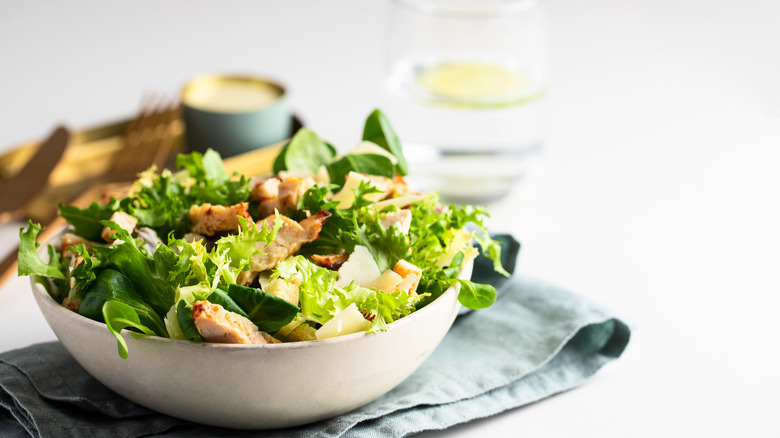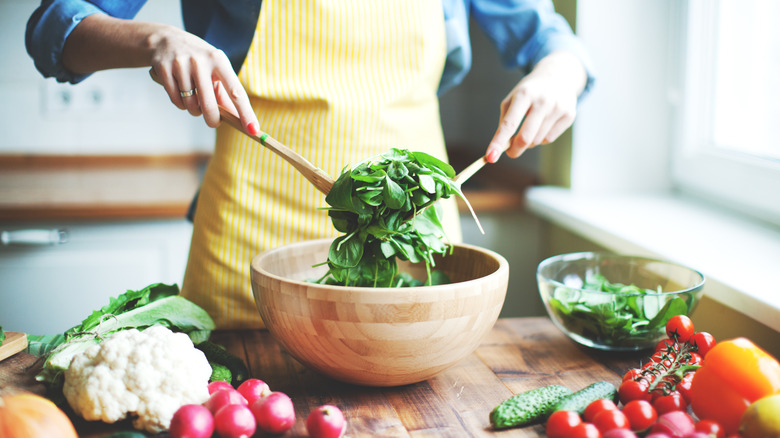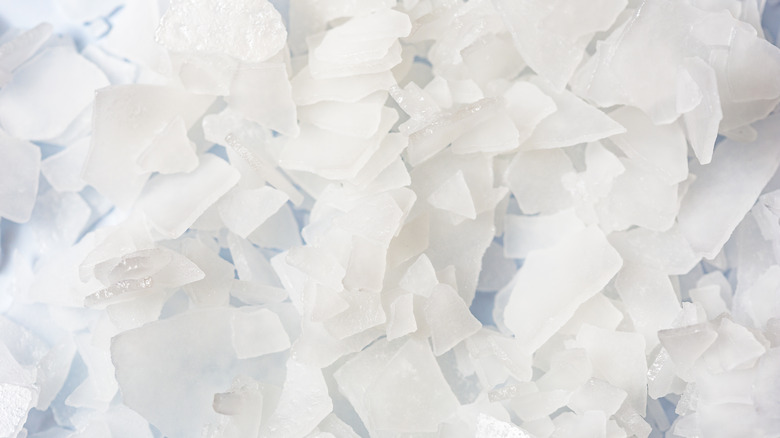Salt Is The Vital Ingredient Your Salad Is Missing
We add salt to every food, from meats to sweets, but there's one ubiquitous dish for which we often overlook it: salad. Ask yourself, how often do you salt your salads? Not just the dressing but the actual vegetables themselves. We'd wager the answer is rarely, if ever, but there are many ways in which a little bit of salt can elevate a salad. It adds its own taste, enhances other flavors, improves texture, and balances the many ingredients we put in our salads, making the final product greater than the sum of its parts. By utilizing different salt varieties, from fine crystals to broad flakes, you can add entirely new dimensions to even the most basic salad.
Salting salad might initially sound strange, but it has a significant precedent. The origin of the name 'salad' lies in salt, originally referring to salted vegetables. Somewhere along the way, we lost sight of this, perhaps because contemporary conversations about salt tend to focus on the downsides of sodium, while salads are seen as the stereotypical epitome of health foods. But a certain amount of salt is vital to our diet, and it only takes a small amount to make a big difference in your food. Salt doesn't need to compromise any of the nutritional value of your salad, but it can vastly enhance the enjoyment factor. That's not just an opinion either; there's science behind it.
How salt affects salad ingredients
Salt affects the flavors and textures of food in multiple ways. Since sodium is an essential nutrient, we are biologically programmed to crave salt, and even a small amount of it naturally increases the pleasurability of food. That's just the tip of the iceberg, though. Adding a salty taste is honestly the least important thing salt does for flavor. Its greater purpose lies in how it affects other ingredients' flavor.
Salt is able to reduce our perception of bitterness. This would be particularly effective in salads built around bitter greens like arugula, endive, and radicchio, which can sometimes overwhelm other flavors. Adding a pinch of salt can mellow the bitterness, creating balance with other salad ingredients like acidic dressing, sweet fruit, or umami-rich cheese. Salt also enhances our perception of sweetness, making it an unexpectedly marvelous addition to fruit salads.
Seasoning fruits with salt is a good idea, even those we don't associate with sweetness, such as tomatoes, cucumbers, and avocados. Adding salt to sliced tomatoes or cucumbers and letting them sit for a few minutes before adding them to the salad will draw out moisture, making their flavors more concentrated. This will also make high-moisture vegetables more crunchy. Furthermore, salt can boost flavor by drawing out intense aromatic compounds. It doesn't make fruits and vegetables taste salty; it makes them taste more like themselves.
What kind of salt should you use on salads?
There are many types of salt, and they will bring something different to your salad, so choose wisely. You should carefully consider the ingredients in your salad before deciding what salt to use and how much to add. For instance, a salad made with bitter greens or sweet fruit would benefit from a relatively generous amount of salt, but salads made with already salty ingredients, such as olives, capers, salted nuts, or anchovies, need a lighter touch. A Caesar salad, for example, shouldn't get too much extra salt, as the anchovies and parmesan in it are already quite salty.
Kosher salt is a fantastic all-purpose option, especially when pre-salting fruits and vegetables to draw out moisture and flavor. The tiny flakes can dissolve into dressings and even into the flesh of produce to create a very even taste. You can add flaky sea salt for a more concentrated punch of saltiness. Flaky salts are commonly called finishing salts because they are the finishing touch of a dish. Add them to a salad at the last moment, and enjoy the subtle crunch they impart. One type of salt you don't want to use is iodized table salt. Its crystals are so small and dense that the saltiness becomes overwhelmingly intense. Adding iodine also imparts a metallic taste that doesn't mesh well with the nuanced flavors of salad.


